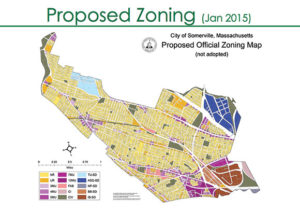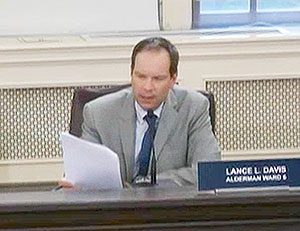
The Board of Alderman received the report of the Land Use Committee’s discussions and findings regarding the new zoning overhaul for the City of Somerville.
By Jim Clark
The Land Use Committee made its presentation to the Somerville Board of Aldermen at their regular meeting last Thursday, reporting on its discussions concerning the impact of the new zoning overhaul in relation to jobs and the overall economic impact on the city.
Committee Chair, Ward 6 Alderman Lance Davis, provided a rundown of discussions that took place at the Committee’s meeting on May 10 of this year.
Director of Planning George Proakis discussed the 30,000 jobs goal and also the difference, from a tax revenue perspective, of lab jobs vs. office jobs, i.e., labs are assessed a personal property taxed on their equipment. SomerVision statistics, jobs and floor space per job, grades and uses of office space were also discussed.
Alderman McWatters inquired about the number of hotels planned and expressed concern about building heights in the development of Union Square.
Mr. Proakis stated that Washington Street (in Union Square) is slated to be in a four story district.
Alderman Heuston spoke about the possibility of pursuing taxes from Air B&B renters. Mr. Proakis stated that Air B&B is addressed in the zoning overhaul and there needs to structure a system for units being rented vs. rooms being rented. The key areas of opportunity are Assembly Square and the Inner Belt. Alderman Heuston also discussed current day family housing vs. family housing of years ago. Units are designed differently, with some people having a shared outdoor and play space.

Chair Lance Davis briefed the Board on the Land Use Committee’s discussions at its May 10 meeting.
Alderman Ballantyne spoke about people wanting to live in an urban setting.
Alderman Connolly discussed people using home offices. Alderman White spoke about families wanting 3 bedroom apartments and he also said that maintaining the school age balance is important.
Chairman Davis relayed his intention to discuss this aspect at future committee meetings during discussions regarding residential neighborhoods.
Mr. Proakis wants to create 5 jobs per housing unit and a 60/40 commercial/residential split. He also wants large scale development issues to stick with the proposed numbers. RCLCO, a company that specializes in urban communities, looked at parcels in the city and their potential.
There are 221 development sites, consisting of about 11,439 square feet. The zoning proposal was discussed, including special permits, mixed use districts, special districts, neighborhood retail vs. formula retail, Brickbottom development, Boynton Yards, types of buildings and the 6,000 vs, 9,000 number of units. Infrastructure improvements are needed in certain areas and Davis Square is in need of office development.
Mr. Proakis stated that the Assembly Square district would not be changed intentionally.
Alderman White spoke of the importance of shadow studies in districts with “as of right” solutions and he stressed the need for commercial development, noting that new residents put a strain on the taxpayers. He prefers holding off on residential development until commercial development happens.
Mr. Proakis explained that some residential development may be necessary in order to attract commercial development.
Alderman Heuston added that there needs to be an incentive for developers, especially for commercial development.
Alderman Niedergang asked for data on the impact of residential vs. commercial development. The owner of Grand Junction, in the Twin City Mall, is interested in doing a mixed use development.
Alderman White requested a map showing the Somerville/Cambridge border. The cores of Davis and Union Squares could be tight little commercial districts.
Alderman Niedergang suggested having penthouse residential units on the top floors. Alderman White discussed the residential exemption numbers that are dropping and said that there is a $350 – 400 increase in taxes, now. He spoke about the loss of 2-3 bedroom housing and the decrease in rental units.
The Committee report was accepted and approved by the Board as a whole.













Reader Comments